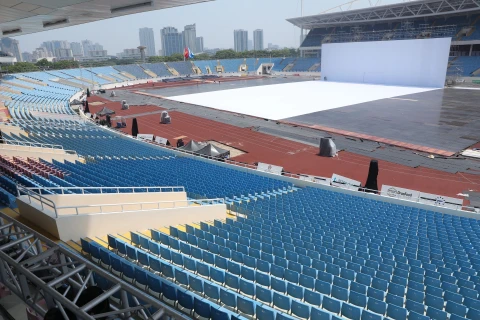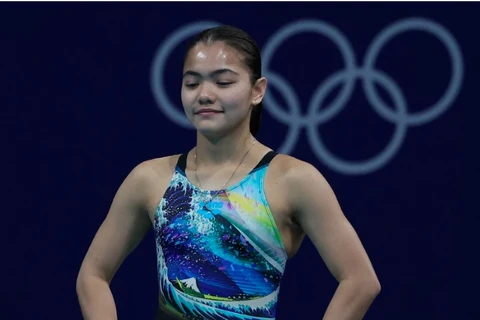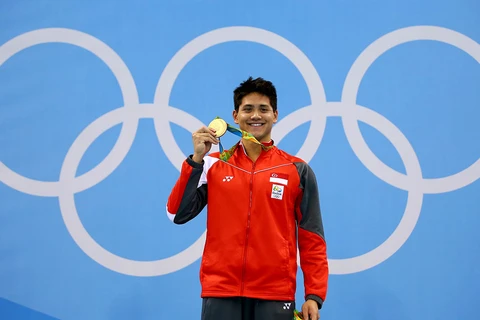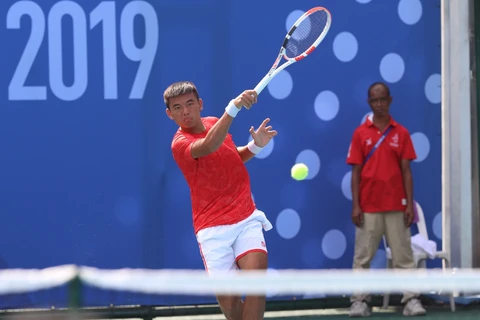Hanoi (VNA) - #Seagamesnoplastic and #Greensport are the hashtags of a campaign launched during the 31st Southeast Asian Games (SEA Games 31) to raise public awareness of environmental protection, according to the Organising Board.
The drive is jointly held by the communications centre at the Ministry of Natural Resources and Environment (MoNRE) and the Vietnam Sports Administration.
It is intended to reduce the use of single-use plastic products and nylon bags at meetings, training venues, matches and other sites for athletes, delegates and journalists, and activities within the biggest regional sport event.
The rule of 3R – reduce, reuse and recycle – has been promoted as part of the communication activities in the campaign.
The media and social networks have been utilised to spread the message of environmental protection through articles.
Notably, special dustbins are designed and set up at stadiums and gymnasiums. Collected waste will be classified, recycled and treated in line with regulations.
Various souvenirs like key rings and handbooks are made from recycled materials such as metal, fabric and wood.
The campaign sees the participation of volunteers who collect waste and perform communication tasks at stadiums and sport venues. They are also provided with training, uniforms, documents and tools to serve the work.
Audiences are also guided to collect waste at stadiums and exchange waste for gifts.
Eco-friendly water bottles, bags, boxes, cups, knifes, spoons, and folks replace single-use plastic products during the Games.
In the localities that host the events, there will be buses carrying the message of environmental protection in SEA Games 31.
SEA Games 31, themed “For a Stronger South East Asia”, will be held in the capital and 11 neighbouring provinces and cities from May 12 to 23.
Featuring 40 sports with more than 500 events, it is expected to attract around 10,000 participants. The biennial event was initially slated for late 2021 but delayed due to the COVID-19 pandemic.
Vietnam aims to use 100 percent of environmentally-friendly plastic bags and packaging at shopping malls and supermarkets by 2025, according to a project on strengthening management of plastic waste in Vietnam approved by Deputy Prime Minister Le Van Thanh.
Other goals include to collect, reuse, recycle and treat 85 percent of plastic waste; to reduce the volume of plastic waste dumped to ocean by half; to have 100 percent of tourism complexes, hotels and other lodging facilities not use non-biodegradable plastic bags and single-use plastic products by 2025.
Additionally, the project will gradually cut the production and consumption of non-biodegradable plastic bags and single-use plastic products in daily life; while raising awareness among organisations, enterprises and the community about the harmful effects of single-use plastic items to the environment, ecosystem and human health, and encouraging consumers to shift away from single-use and non-biodegradable plastics to eco-friendly alternatives.
It will campaign producers and distributors of single-use and non-biodegradable plastic products to shift to eco-friendly equivalents and promote the development and application of advanced technology in plastic waste management and manufacturing of environmentally-friendly products.
The project will also build a network of local communicators who are tasked to instruct people on how to properly classify, reuse and treat plastic waste and waste at large; and integrate knowledge about single-use and non-biodegradable plastics into school curriculums at all levels.
Vietnam is said to be the world's fourth-largest marine plastic polluter after China, Indonesia and the Philippines. Each year, the country reportedly dumps an estimate of 300,000 – 700,000 tonnes of plastic waste into the ocean per year, accounting for 6 percent of the world's marine plastics./.
It is intended to reduce the use of single-use plastic products and nylon bags at meetings, training venues, matches and other sites for athletes, delegates and journalists, and activities within the biggest regional sport event.
The rule of 3R – reduce, reuse and recycle – has been promoted as part of the communication activities in the campaign.
The media and social networks have been utilised to spread the message of environmental protection through articles.
Notably, special dustbins are designed and set up at stadiums and gymnasiums. Collected waste will be classified, recycled and treated in line with regulations.
Various souvenirs like key rings and handbooks are made from recycled materials such as metal, fabric and wood.
The campaign sees the participation of volunteers who collect waste and perform communication tasks at stadiums and sport venues. They are also provided with training, uniforms, documents and tools to serve the work.
Audiences are also guided to collect waste at stadiums and exchange waste for gifts.
Eco-friendly water bottles, bags, boxes, cups, knifes, spoons, and folks replace single-use plastic products during the Games.
In the localities that host the events, there will be buses carrying the message of environmental protection in SEA Games 31.
SEA Games 31, themed “For a Stronger South East Asia”, will be held in the capital and 11 neighbouring provinces and cities from May 12 to 23.
Featuring 40 sports with more than 500 events, it is expected to attract around 10,000 participants. The biennial event was initially slated for late 2021 but delayed due to the COVID-19 pandemic.
Vietnam aims to use 100 percent of environmentally-friendly plastic bags and packaging at shopping malls and supermarkets by 2025, according to a project on strengthening management of plastic waste in Vietnam approved by Deputy Prime Minister Le Van Thanh.
Other goals include to collect, reuse, recycle and treat 85 percent of plastic waste; to reduce the volume of plastic waste dumped to ocean by half; to have 100 percent of tourism complexes, hotels and other lodging facilities not use non-biodegradable plastic bags and single-use plastic products by 2025.
Additionally, the project will gradually cut the production and consumption of non-biodegradable plastic bags and single-use plastic products in daily life; while raising awareness among organisations, enterprises and the community about the harmful effects of single-use plastic items to the environment, ecosystem and human health, and encouraging consumers to shift away from single-use and non-biodegradable plastics to eco-friendly alternatives.
It will campaign producers and distributors of single-use and non-biodegradable plastic products to shift to eco-friendly equivalents and promote the development and application of advanced technology in plastic waste management and manufacturing of environmentally-friendly products.
The project will also build a network of local communicators who are tasked to instruct people on how to properly classify, reuse and treat plastic waste and waste at large; and integrate knowledge about single-use and non-biodegradable plastics into school curriculums at all levels.
Vietnam is said to be the world's fourth-largest marine plastic polluter after China, Indonesia and the Philippines. Each year, the country reportedly dumps an estimate of 300,000 – 700,000 tonnes of plastic waste into the ocean per year, accounting for 6 percent of the world's marine plastics./.
VNA
























